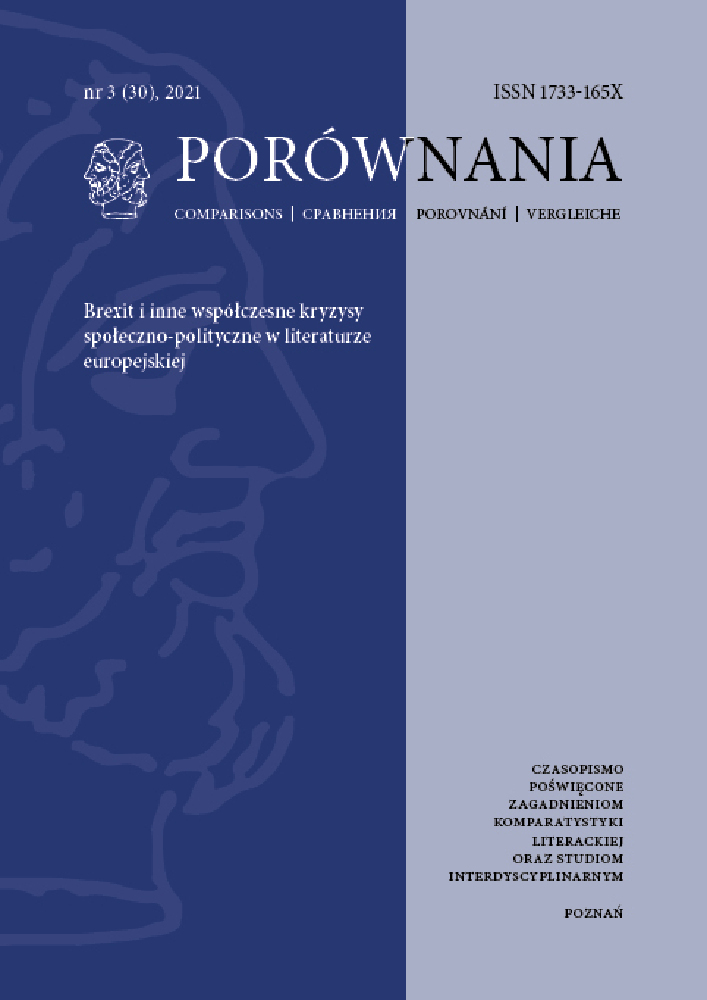Аннотация
At a time of when the global crises of pandemic and climate change could be said to offer sufficient challenges to life in the British and Irish Isles, the implementation of Brexit provides a further gargantuan difficulty. Borders, bureaucracies and belief systems dissolve like the certainty that subjects once felt to their connection to states or Unions. Or new borders and systems appear, bringing with them unwieldy new protocols and practices. Shelves empty, goods sit locked in containers; caught up in the holding pattern of another new normal of online retail inertia. Dislocation, fear and anger rise. The epicentre of the Brexit shambles can be said to be located in the ever betwixt and between location of Northern Ireland. Here with its newly imposed sea border with Great Britain and its maintenance of European Union relations with the Republic of Ireland we see a fractured and fractious society struggling as ever to come to terms with how to balance the aspiration of opposing ideologies and national ambitions with an additional level of chaos. In a time of catastrophe what can literature do? This question, often posed during “The Troubles” has very much come back to be painfully reiterated to writers, readers and critics at a time of multiple lockdowns. However, if an examination is made of publishing in Ireland in the last couple of years, we see a buoyant press offering a number of intriguing responses to the significance and efficacy of literature to respond to the current human predicament. In this article I will examine the work of three contemporary writers, Gerald Dawe, Angela Graham, and Dara McAnulty. I will argue that their use of genre (memoir, short story, nature diary) provides a fresh and robust response to the chaotic present of Northern Irish political life. In their separate ways they contest the fixed, static and impermeable political echo chamber of Northern Ireland. Dawe, I contend, seeks a means through his autobiographical work to retrace time and space in the history of the province and articulate alternative ways of interpreting the past. He is able to draw sustenance and restoration from often overlooked times of possibility in his own and the wider story of Belfast. In Graham’s case, I would suggest that her bold and assertive first collection of short stories provides an acerbic and raw inspection of the past but one that also provides glimpses of reconciliation and genuine hope in the face of trauma. I conclude by exploring the work of McAnulty. Ostensibly a diary that traces his engagements with nature, his book is a tour de force that reimagines Ireland as a location gripped in the ravages of the Anthropocene startlingly brought to life by a young man faced with the challenges of autism. Part memoir, part praise poem to nature, it is a remarkable coming of age non-fiction work, which along with Dawe’s and Graham’s writing suggests that Northern Irish literature offers a broad and brilliant retort to the current local and global calamities that we face.
Библиографические ссылки
Dawe, Gerald. Looking Through You. Newbridge: Irish Academic Press, 2020.
Graham, Angela. A City Burning. Bridgend: Seren Books, 2020.
McAnulty Dara. Diary of a Young Naturalist. London: Ebury, 2020.
Walker, Gail. “Opportunity Now for Leadership to Emerge in Unionism to Embrace the Future... but Does Anyone Have the Vision?,” Belfast Telegraph, 10 April 2021, https://tinyurl.com/nyzx6wpx.
Heidemann, Birte. Post-Agreement Northern Irish Literature Lost in a Liminal Space?. Cham: Palgrave, 2016.
Smyth, Damian. “Fortnight and Fifty Years of Contested Writing in the North,” Fortnight 479 (September 2020): 50–53.
Лицензия
Utwory opublikowane w czasopiśmie „Porównania”, na platformie Pressto należącej do Uniwersytetu im. Adama Mickiewicza w Poznaniu są udostępniane na licencji Creative Commons Uznanie autorstwa - Bez utworów zależnych 4.0 Międzynarodowe (CC BY-ND 4.0)
Tym samym wszyscy zainteresowani są uprawnieni do korzystania z utworów opublikowanych pod następującymi warunkami:
-
uznania autorstwa — czyli obowiązek podania wraz z rozpowszechnianym utworem informacji o autorstwie, tytule, źródle (odnośniki do oryginalnego utworu, doi) oraz samej licencji
-
bez utworów zależnych — remiksując, przetwarzając lub tworząc na podstawie utworu, nie wolno rozpowszechniać zmodyfikowanych treści.
-
brak dodatkowych ograniczeń — nie można korzystać ze środków prawnych lub technologicznych, które ograniczają innych w korzystaniu z utworu na warunkach określonych w licencji.
Uniwersytet im. Adama Mickiewicza w Poznaniu zachowuje prawo do czasopisma jako całości (układ, forma graficzna, tytuł, projekt okładki, logo itp.).
Autor zachowuje prawa majątkowe, ale udziela zgody Uniwersytetowi im. Adama Mickiewicza w Poznaniu na wykorzystanie dzieła. Autorzy tekstów zakwalifikowanych do publikacji proszeni są o wypełnienie podpisanie i przesłanie umowa (PL) agreement (EN)
Agreement for granting a royalty-free license to works with a commitment to grant a CC sub-license





